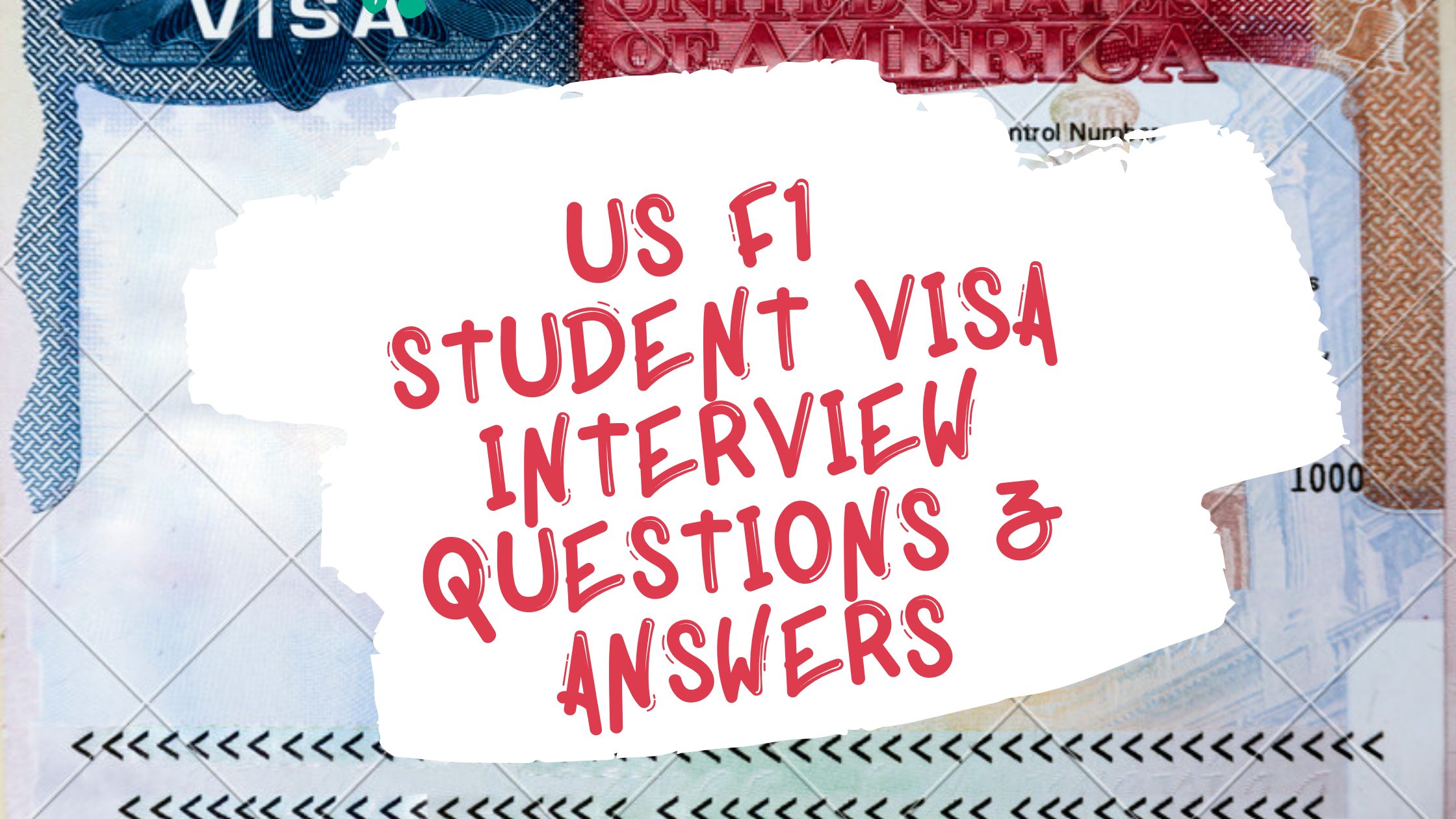Any non-US citizen planning to study in the United States or rather US, will need to apply for an F or M US student visa unless of course they are visiting the US on a visitor (B) visa or through the Visa Waiver Program (VWP), to undertake recreational study (non-credit) as part of a tourist visit.
In today’s post, I share with you the most frequently asked student F1 visa interview questions by the visa officer when you submit your application for an F1 or M US student visa.
As will be evident from the FAQs, the questions mostly are pegged around your reasons for wanting to study in the US (instead of in your home country) and the university or college you plan to study at.
The student F1 visa officer attending to your case will also try to determine whether you have strong enough ties to your home country to be motivated to return after finishing your studies.
Make sure to truthfully respond to questions and that whatever you say at interview matched what you indicated in your form DS160 which you submit with your F1 student visa application.
So without much further ado, here are some of the most frequently asked questions at the US F1 Student visa interview at the US embassy plus answers to the interview questions:
But first, Full disclaimer: All questions and answers are based on my experience and those that were interviewed and were gracious enough to share with me their experiences. I do not and have never worked for as a US visa officer. This post is just to give you an idea of what to expect at your US F1 Student visa interview.
I have split these most frequently asked questions at the US F1 Student visa interviews into the following 5 main parts:
- F1 student visa questions and answers, Part 1: University / College / Academics related questions.
- F1 student visa questions and answers, Part 2: Your finances
- F1 visa questions and answers, Part 3: Relations & family members
- F1 visa questions and answers, Part 4: Work – related
- F1 visa questions and answers, Part 5: General questions
What's Covered in This Article
With these set of questions, the visa officer attending to your case will focus on questions related to the college or university you intend to study at.
Respond with name of university and location.
e.g. United States International University, Nairobi Campus
23. In what year did you get your Bachelor’s degree and from which university?
Respond with year e.g. 2001
24. How long are you planning to stay in the United States?
Respond with the number of years. Make sure it matches exactly the length of your course. No more, no less.
e.g. 2 years.
25. Tell me more about your academic background.
Respond accordingly. I have a Bachelors in film from USIU in Nairobi , and a Masters in Digital communication from Nairobi university.
26. Why are you going to the US?
To study.
27. What will you specialize in for your degree?
Digital cinematography
28. What will be your major?
Film and video
29. Why are you planning to continue your education?
I am planning to continue my education because I would like to be outfitted for the changing landscape and learn of the latest technological tools and concepts in film and cinematography.
30. Can you not continue your education in your home country?
- Yes I can, but no university in Kenya currently offers this course
- Yes can, but I want to take advantage of the global exposure that comes with studying outside of my country. Moreover, by going to Full Sail University (*Insert your university/college*), I will get to finish faster and start my career/move back home/ sooner since their programs contain more credit hours per month than similar traditional universities.
31. How many colleges did you apply to? or Which other universities did you apply to?
32. How many schools did you get admitted to?
33. How many schools rejected you?
34. What was your (GRE, GMAT, SAT, TOEFL, IELTS) score?
Respond accordingly.
Could you please show me your (GRE, GMAT, SAT, TOEFL, IELTS) results?
Hand over to the visa officer the original transcript of the exam result.
F1 Student Visa Questions, Part 2: Your Finances
The goal of the F1 visa interview questions asked under this section is for the visa officer to ascertain whether or not you are able financially support your studies in the United States, without having to rely on the US system or seek employment outside the university.
Note: With your F1 student visa, you are legally allowed to work only a maximum of 20 hours a week, and only within the confines of your university/college.
So make sure to carry supporting documents such as up to date bank statements etc. to support your answers and build a case for you.
9. Tell me more about your father’s/mother’s job and income and how long they have been working for the company.
Respond accordingly.
10. What is the monthly income of the person who is going to sponsor your studies?
Respond accordingly.
11. Apart from that, tell us more of your sponsor’s annual income?
Respond accordingly.
12. Can I please see your current bank statement.
Hand over the bank statement to the visa officer
13. If you are planning to stay for x years, how will you finance your education and your living?
I have enough money to cover my course fee and living expenses for the x years.
F1 Student Visa Questions, Part 3: Relatives & Family
For the family and relatives part of the F1 student visa interview, following are the most frequently asked US embassy F1 visa interview questions related to the family:
2. How many brother and sisters do you have? or How many siblings do you have?
Respond accordingly.
- I have 3 brothers and 2 sisters.
- I am an only child
3. Tell me more about your brother/sister? Are any of them living in the United States?
Respond accordingly
4. What does your father/mother/sister/brother do? Where does he/she live?
Respond accordingly.
Fore example:
- My father is a doctor at Nairobi Hospital. He graduated from Oxford university in 1979
- My mother is an aeronautical engineer and she runs her own aviation firm. She graduated from UCLA in 1986.
- My sister is a house-wife.
5. What is your father/mother/sister/brother’s income?
It is business and income varies from xyz to xyz Lac INR/annum depending on profit.
6. What will you do if your student visa is rejected? or What are your plans if your student visa is not approved?
Depending on the reasons given for the visa rejection, I will either re-apply again or consider alternative locations to pursue my studies.
7. Are your parents supportive of your decision to study in the U.S?
Why?
They believe that the quality education and global perspective I will get by studying in the US will be a game-changer for me once I return home.
8. Will you be coming back to home during vacations/ holidays? or Will you be going home during the semester breaks? or Are you planning to go home during your summer vacation?
Answer accordingly with a Yes, no, or I don’t know yet.
Yes. I intend to come back and meet my family and friends here in Kenya, especially during the long summer holidays if I will not be taking any classes.
No. I have already planned to work on my senior project during summer seeing that our course if fast tracked. Or I will try to get an assistantship in my department so will be unable to go home during vacations.
9. I realize you have many brothers and sisters, will your parents be able to afford your education abroad in the United States?
Yes. My parents still have earning from the family business and my father’s consultancy. They also have liquid assets worth a total of KES 9 million such as education insurance policies for my siblings to make sure that their studies are not jeopardized in future.
10. Do you have any relatives studying at the same university you are planning to go to?
Answer accordingly.
11. Are you in a relationship?
Respond accordingly
F1 Student Visa Questions, Part 4: Work & Job
Tip: The core principle for this part of the interview is to constantly prove that you have the intention and motivation to return your home country upon completion of your studies, due to your strong family, and economic ties.
Make sure to carry relevant supporting documents such as: your employer introduction letter, leave approval letter, school introduction letter, business cards, business registration certificates, tax certificates, pay slips, CV, etc.
Following are some of the most frequently asked F1 US student visa interview questions:
1. What will you do after completing your studies in the US? or Once you finish your studies, do you plan to stay in the United States to work? or How do I prove that you are going to come back?
- After completing my studies, I will come back to Kenya and focus on growing my film business/my career.
- After completing my computer science studies, I intend to come back and settle here in Nairobi (commonly known as Africa’s silicon savannah) where lots of the global technical conglomerates reside here.
2. Where do you currently work? What do you currently do?
Respond accordingly.
3. Why are you leaving you current job?
Respond accordingly.
For example:
- My ultimate career goal is to become a certified cinematographer. With Full Sail’s Digital Cinematography bachelor’s degree (insert your university and course), I will be better outfitted to pair knowledge of the latest technological tools with a strong foundation in storytelling, hence better placed to deliver in a similar role as my current job or another position.
- My whole intention to go to the US is to study and gain the latest film and video technology knowledge which will give me chance to work on those technologies upon returning home.
- I am not leaving my job. My employer has been gracious enough to grant me a study leave so I will come back to work at the company upon completion of my studies.
4. Can I please see your current CV?
Hand it over to the visa officer
5. What is your current salary?
Respond accordingly
6. Do you plan on working while studying?
Please note that with your F1 student visa, you are only legally allowed to work for 20 hours per week, and on-campus.
You can answer as follows:
I am not keen to work while studying because I want to focus on my course work. However, I may consider working on-campus if I find an opportunity for work experience related to the course I will be taking.
7. How much money can you earn after your completing your studies? or What are your job prospects on completion of your chosen course of study?
Do your homework before your US embassy interview.
You can also check out where most alumnus of your university who took the same course are currently working so you get an average salary package.
Make sure your answer is based on your home country estimates as you should ideally be returning there when you complete your studies.
8. Why don’t you think of taking up a job in the US after your education because you will likely earn more?
8. Most applicants like yourself go to America and never return. What about you? Do you plan to come back to Kenya once you finish your studies?
F1 Student Visa Questions, Part 5: General Questions
In this section of the most frequently asked F1 student visa questions, you find a whole potpurri of questions that may not necessarily fit in the other 4 parts.
7. Do you think you deserve to get an F1 visa?
Yes
8. Why should you be granted a student visa? or Why should we give you the possibility to study in the United States? or Why should I approve your visa?
I believe I should be granted a student visa because pursuing my studies at one of the world’s top ranked universities in the field entertainment and media (insert your field) will help me achieve my long-term goals. By furthering my education in digital cinematography (insert your course), I can work towards my career goals. I aim to make a positive difference upon returning back home to my country, and this degree will absolutely be the difference-maker when it comes to seizing the plethora of opportunity that awaits me upon graduating with an American degree.
9. What do you know about the city your university is located in?
It is the home of Disneyland.
10. Are there any reasons why you shouldn’t be granted an F1 visa?
No. None that I can think of at the moment.
I have an admission from one of the world’s top ranked university. I have sufficient funds to cover both my tuition and living expenses for the period of study, and I am excited to come back and seize the opportunities that await me back home.
Are you on Pinterest? Save for Later!



